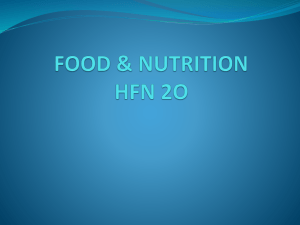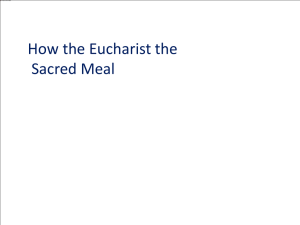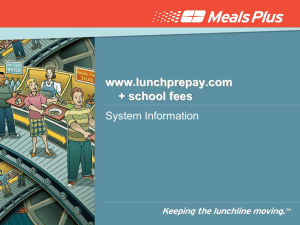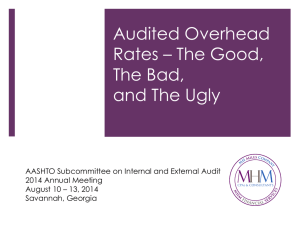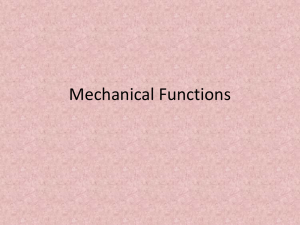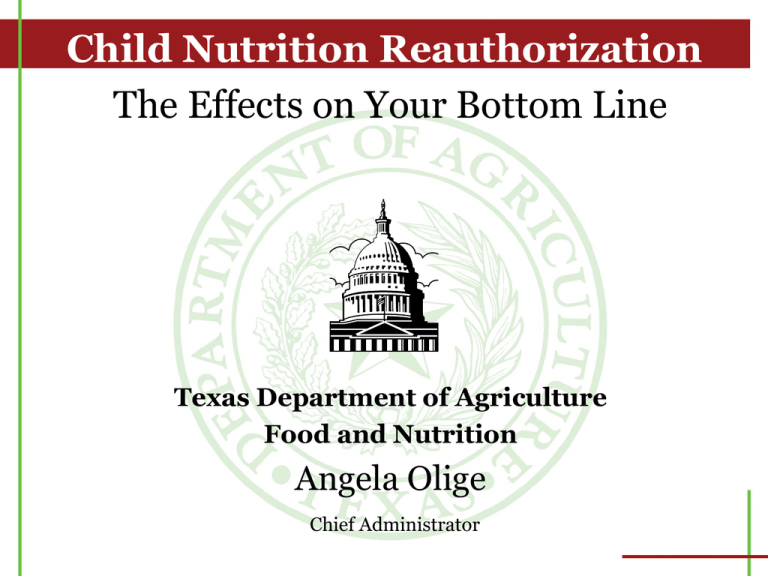
Child Nutrition Reauthorization
The Effects on Your Bottom Line
Texas Department of Agriculture
Food and Nutrition
Angela Olige
Chief Administrator
Presentation Overview
• Introduction
• Reauthorization Summary
• School Food Financing Provisions
• Wrap-Up and Final Q&A
Nutrition Quality Impact
• Enhances school nutrition quality
• Performance based increase (Sec. 201)
•
Coincides with new Nutrition Standards for NSLP/SBP
• Expands oversight for national nutrition standards (Sec. 208)
• $5 Million funding for farm-to-school programs (Sec. 143)
• Strengthens local wellness policy (Sec. 204 & 209)
• Milk Options (Sec. 202)
• Water availability (Sec. 203)
Nutrition Quality Impact
• Bottom Line Impact
• Revenue
•
General Fund (GF) & Food Service Account(FSA)
• Cost
•
•
Food
Staffing Cost
• Infrastructure
Grant Opportunities and Operational Changes
• Grant Expansion of School Breakfast Programs (Sec. 105)
• Improves Direct Certification (Sec. 101 -103)
• Supports Paperless Universal Meal Service (Sec. 104 -105)
• Full use of federal funds in state agencies (Sec. 361)
• Changes social security number requirement (Sec. 301)
Grant Opportunities and Operational Changes
• Bottom Line Impact
• Revenue
• Staff
• Procedures
• Forms
School Food Financing Provisions (SFFP)
• Equitable
• Meal Price
• Revenue Generation
• Allowable
• Expenses
• Cost allocation
SFFP – Meal Equity
Equity in School Lunch Pricing (Sec. 205)
• Intent
• Ensure equitable lunch pricing structure
• Paid Lunch Defined
• Reimbursable meal served to students who are not certified
to receive free or reduced - price meals
• Requirements
• Annual review & meal adjustment as applicable
• Allowable exceptions
• Collection and publishing of prices
SFFP – Meal Equity cont’d
•
SY 2010-2011 lunch price impact
•
Prices between $1.60 – $2.40
•
•
increase the meal average price by $0.05
Schools that currently charge less than $1.60
•
required to gradually increase their prices over time until requirement is
met
• Paid Lunch Equity Tool
• www.fns.usda.gov/cnd/Governance/Legislation/CNR_2010.
htm
• www.squaremeals.org
*CNR – Child Nutrition Reauthorization
SFFP – Meal Equity cont’d
•
Exceptions
•
•
•
How can I not raise prices?
May I lower prices?
Both can be accomplished with funding from non-federal
sources
•
•
Must equal the difference between the average price required
and the average price charged
Can not use revenue from sale of foods sold in competition with
meals served as reimbursable school meals.
SFFP – Meal Equity cont’d
•
What if my bottom line is already black?
•
Balance of 3-Months worth of operating expenses allowed
•
•
7 CFR 210.19(a)(2)
What if my bottom line is over the allowed balance
•
Upgrade equipment
•
•
•
•
Prior approval required from TDA for all capital expenditures $5,000
Improve Quality of Meals
Increase Nutrition Education
Increase Staff Training
SFFP – Meal Equity cont’d
• Bottom Line Impact
• Revenue (GF) & (FSA)
• Participation
• Board Approvals
SFFP – Revenue Equity
Equity in Non-program Food Revenue (Sec. 206)
• Intent
• To ensure the overall revenue from non-program foods
meets or exceeds the cost of obtaining these foods
• Non-program revenue defined
• Revenue from food sold outside of reimbursable school
meals
SFFP – Revenue Equity cont’d
• Non-program food purchased for the school food
service account must have
• All revenue generated from the sale of the food purchased
credited to the school food service account
• Must generate revenue at least equal to their cost.
•
Includes a la carte, snack bar, catering, and vending
• Must determine food cost
• “Profit sharing”
• No longer allowed
• Effective Implementation
• July 1, 2011
SFFP – Revenue Equity cont’d
• Bottom Line Impact
•
•
•
•
Revenue (GF/FSA)
Participation
Procurement procedures
Operational procedure
SFFP – Allowable Costs
Allowable cost ( 2 CFR 225)
•
Some Basic Guidelines
• Be necessary and reasonable
• Be allocable to Federal awards
• Be authorized or not prohibited under State or local laws or
regulations
• Conform to any limitation or exclusions in 2 CFR
• Be consistent with policies, regulation and procedures that apply
uniformly to both federal award and other activities
• Be accorded consistent treatment
SFFP – Indirect Cost
• Requirements of USDA per CNR
• Must issue guidance for indirect costs
•
•
Defines proper classification of costs
Discussion on the treatment of certain typical costs for
school meal programs
• Must conduct an indirect cost study
•
Assess the extent that schools are paying indirect costs
•
•
•
•
•
•
Allocation and methodology
Impact on to school food service account
Types and amounts charged and recovered by districts
Consistency with requirements for allocation
Costs that could be charged but are not
Issue additional guidance as identified
SFFP – Indirect Cost cont’d
Indirect Cost Guidance ( Sec 307)
• Intent
• To ensure reasonable costing principles are applied
consistently over the organization receiving federal funds
• Definitions
• Indirect costs are incurred for the benefit of multiple
programs, functions, or other cost objectives.
• Direct costs are incurred specifically for a program or cost
objective.
SFFP – Indirect Cost cont’d
• Guidance provides definitions for both direct and
indirect costs, including
• Proper classification of costs
• Discussion on the treatment of certain typical costs in the
NSLP and SBP
SFFP – Indirect Cost cont’d
• Guidance provides criteria that will aid in
determining allowable costs
• Appropriate rate usage
• TEA Financial Accountability Resource Guide (FAR)
• Supplant versus Supplement Clause in Grant
• Determines the type of indirect cost rate
• NSLP and SBP have no such clause therefore
• Unrestricted rate utilized
• http://www.tea.state.tx.us/index4.aspx?id=1222
SFFP – Indirect Cost cont’d
• Cost application
• Cost may be direct or indirect but can not be both
• Cost Examples
• These examples are not meant to imply this is the only way to classify the
costs listed
Indirect Cost
• Utilities
• Financial Services
• Procurement
Direct Cost
•
•
•
•
•
Compensation
Materials
Equipment
Travel
Dumpster
SFFP – Indirect Cost cont’d
• Bottom Line Impact
•
•
•
•
Revenue (GR/FSA)
Accounting procedures
Operational procedures
Cost allocation plan assessment
SFFP –Bad Debt
• 2 CFR 225 Guidance
• Bad debts, including losses (whether actual or estimated)
arising from uncollectable accounts and other claims,
related collection costs, and related legal costs are
unallowable.
• Accounting Procedure
• Bad debts may not be carried forward to the next fiscal
year.
• The school food service account must be made whole
SFFP –Bad Debt
• Examples: Bad debt for school food service accounts
• Student meal charges
• Negative cash balances
• How should food service handle bad debt?
• Student meal charges
•
•
Becomes an account receivable (AR) in the general fund
General fund must transfer cash equal to the total AR.
• Negative balances at year end in the cash account
•
General fund must bring cash accounts to zero
SFFP –Bad Debt
cont’d
• What about loans between GF and SFA
• Allowable if executed properly
• May not be retroactive
• May not cross school years
•
What about positive student meal balances?
•
•
•
•
Districts book as deferred revenue ( Per TEA)
May not simply offset other student debt
Utilize donation policy for non-returning students
Follow CPA Guidance for unclaimed property
•
http://www.window.state.tx.us/up/reporting.html
SFFP –Bad Debt
• Bottom Line Impact
•
•
•
•
Revenue (GR/FSA)
Accounting procedures
Charge Policy
Donation Policy
Partners for Progress
•
Shared Responsibilities
•
•
•
•
•
Management oversight
Program integrity
Compliance Review
Staff Training
Shared Goals
•
•
Financial viability
Quality nutrition
Partners for Progress
• Bottom Line Impact
•
•
•
•
•
•
Maximize Revenue ( GF/SFA)
Mitigate losses
Increase Operational Efficiency
Enhance Nutritional Quality
Increase Student Participation
Positive Public Perception
Funding and Discrimination Statement
Our services are provided through the Texas Department of
Agriculture’s Food and Nutrition Program funded by the U.S.
Department of Agriculture, Food & Nutrition Division. In
accordance with Federal Law and U.S. Department of Agriculture
policy, this institution is prohibited from discriminating on the
basis of race, color, national origin, sex, age, or disability.
To file a complaint of discrimination, write USDA, Director, Office
of Adjudication, 1400 Independence Avenue, SW, Washington,
D.C. 20250-9410 or call toll free (866) 632-9992 (Voice).
Individuals who are hearing impaired or have speech disabilities
may contact USDA through the Federal Relay Service at (800) 8778339; or (800) 845-6136 (Spanish). USDA is an equal opportunity
provider and employer.
Q&A
Questions?

